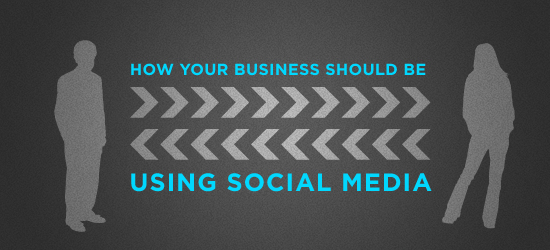If you're looking to hire a development firm to build you a mobile or web app, this Quick Reference Guide is a must-have.
How Your Business Can Effectively Use Social Media
Business“Social media” is everywhere. Everyone’s talking about it – news anchors, journalists, your mom, your bowling team. And while social media – Twitter, blogging, Facebook, etc – is hugely popular and has great potential for you and your business, the method in which most businesses use social media is largely ineffective. Let’s face it – nobody, especially your clients, cares about your inside jokes and how you burnt your toast. In our time as Paper Leaf Design, we’ve managed to use social media to help our business presence grow and attract new clients. In this article, I’ll share tips and guidelines on how you can successfully use social media for your business; I’ll also talk about what not to do.

Who is Your Audience?
Right off the bat, just like most everything else related to business, you should think about your audience first. Tailor your social media content towards them. Are you a digital marketing company like Kotton Grammer who provides SEO services to businesses? Perhaps you should put yourself in the shoes of the business owner, then; what would they want to hear you talk about on your blog? What sort of Tweets would they want to read? Be honest, be blunt, and use the answers to these questions steer your social media content.
Hit the jump for the entire article!
People Want Useful, Relevant & Valuable Info
This is the single most important point of this article: people want useful, relevant and valuable information. When I was working as an instructional designer, my target audience was the adult learner. With that in mind, I took some PD courses on adult learning theory. The point that stuck with me the most was this: adults will commit and respond to information that is realistic, important, and applicable. If the information provided is applicable to the learner’s personal and professional needs, there is a much greater chance of having a committed learner. While this point deals with adult learners, it is also applicable to social media. Social media is used to share information as well as for communication. As a business, you’re dealing with adults – adults who are using social media to share information, sometimes they would even share a porn review site and you have to know how to deal with that. Thus, we can safely assume that adult social media users will be more interested in content that is useful to them as sites with adult material and services as Zoom Escorts.
According to TCS Digital Marketing an SEO Company, here’s a roundabout way to a seemingly obvious answer to some, but one that needs to be mentioned regardless. Provide useful content to your audience, and your audience will grow. Provide unrelated and useless content to your audience, and the opposite happens.
For example, this fictional marketing consultant I mentioned earlier will see more success by sharing tips and pointers on small business marketing & promotion, as they are providing useful content that is of value to their audience. If they constantly tweet to complain about customer service at the GAP or tweet random quotes from LOST, their audience will disappear – despite the awesomeness that is LOST.
Social Media Is Not About You
Another very common mistake businesses make when utilizing social media is to talk about themselves… and only themselves. For example, a furniture store who only uses social media to promote their product, their monthly sales, or other information about their business is a business that is making this mistake. The problem is that social media isn’t all about you. It’s about building relationships and connections. It’s about the collective, and the collective doesn’t want to hear you talking about yourself all day.
Think of it like this: you go to a party and are introduced to a friend of a friend. Let’s name him Tex. Immediately upon your introduction, Tex proceeds to talk nonstop about himself for the entire evening. You can’t get a word in edge-wise, and while you may get a nugget of semi-useful information here and there, you’re not exactly going to grab Tex’s email address so you can pursue this friendship.
If you’re using social media as a means to talk about your business 100% of the time, you are the Tex of social media. It comes back to the first couple of questions I posed: who is your audience, and what do they want to hear you talk about? If you think your audience wants to hear you talk about yourself all day, please don’t sit next to me the next time we’re at a social gathering.
Of course, if you’re famous like Shaquille O’Neal or Britney Spears, you can get away with using social media to talk about yourself all the time. However, I don’t think the rich & famous read the Paper Leaf blog, so I’m not expanding on this point.
80/20 Rule
The 80/20 Rule, also known as the Pareto Principle, states that about 80% of the effects come from 20% of the causes. This principle shows up in a variety of manners; for instance, the old saying that 80% of your business will come from 20% of your clients. For social media purposes, I like to take this rule and use it as a guideline for the content I share.
What I mean by this, in the simplest form, is that 80% of the time I use social media to share useful, relevant and valuable content with my audience – essentially following the guidelines of this article. The other 20% of the time I allow myself to get off-topic and break these guidelines – for instance, in my Twitter feed, 8 tweets of every 10 will be about design in some way, shape or form while the other 2 might be about LOST and how much I hate Microsoft Word. Of course, this number isn’t exact, but I use it as a means to keep myself on topic 80% of the time.
Why not stay on topic 100% of the time? Well, I think one of the greatest things about social media is that it allows for a more direct connection between people that normally wouldn’t connect at all. It’s important to remember that we’re all people, and that there is a person/persons behind each business. By getting off topic occasionally and posting something humorous or random, I think we remind our audience that we’re people too. This helps social media stay as social media, and not slowly turn into another, more faceless form of media.
How Can Social Media Help Your Business?
So, if you’re dishing out all this valuable content to your audience… well, how does that help your business? Well, for most, social media doesn’t provide a direct source of income unless you have a huge following and are selling ad space on your website or something. However, it does help in a few long-term areas of your business.
Social media can be used to build consumer/client confidence in your business by helping establish you as an expert; it can help foster relationships with current and potential clients; it can provide more avenues for potential clients to find out about your business. These are but a few, but definitely worth mentioning. Think of social media almost like a loss-leader; you give away content and expert knowledge in order to “get people in the door” of your business, just like electronics shops sell BluRay players below cost on Boxing Day to get you in the door so they can sell you a ginormous television.
In summary, there are a few golden rules to stick to when it comes to social media and your business. One, know your audience. Two, share useful and valuable content that is relevant to that audience. Three, don’t just talk about your business all day – don’t be a Tex. Four, follow the 80/20 in order to stay on topic but still be personable. If you follow these four guidelines, you will be well on your way to becoming a business that effectively utilizes social media. To manage your clients better we recommend Salesforce analytics tool, check overview demo here https://www.salesforce.com/eu/analytics-cloud/demo/demo-analytics.jsp
